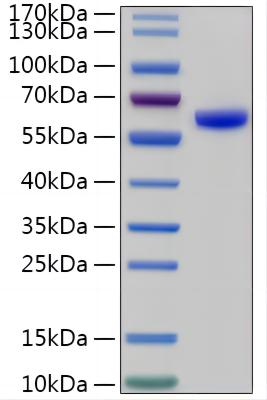Description
Recombinant Human Tripeptidyl-peptidase 1/TPP1 Protein
The Recombinant Human Tripeptidyl-peptidase 1/TPP1 Protein is a biologically active recombinant protein that plays a significant role in various cellular processes and signaling pathways in human biology. This protein is widely employed in immunological research, cell biology studies, protein-protein interaction analyses, and therapeutic development, providing researchers with a reliable tool for investigating Tripeptidyl-peptidase 1/TPP1 function and its implications in health and disease.
This product (SKU: RPCB2197) is produced using Baculovirus-Insect Cells and features a C-His tag for convenient detection and purification. The protein exhibits a calculated molecular weight of 60.7 kDa. with an observed molecular weight of 60 kDa. under denaturing conditions, achieving ≥ 95 % as determined by SDS-PAGE., ensuring exceptional quality and consistency for research applications.
Key Features
| High Purity by Affinity Chromatography | |
| Mammalian & Bacterial Expression Systems | |
| High lot-to-lot consistency via strict QC |
| Product Name: | Recombinant Human Tripeptidyl-peptidase 1/TPP1 Protein |
| SKU: | RPCB2197 |
| Size: | 50 μg |
| Reactivity: | Human |
| Synonyms: | Tripeptidyl-Peptidase 1, TPP-1, Cell Growth-Inhibiting Gene 1 Protein, Lysosomal Pepstatin-Insensitive Protease, LPIC, Tripeptidyl Aminopeptidase, Tripeptidyl-Peptidase I, TPP-I, TPP1, CLN2 |
| Tag: | C-His |
| Expression Host: | Baculovirus-Insect Cells |
| Calculated MW: | 60.7 kDa. |
| Observed MW: | 60 kDa. |
| Gene ID: | 1200 |
| Protein Description: | High quality, high purity and low endotoxin recombinant Recombinant Human Tripeptidyl-peptidase 1/TPP1 Protein (RP03205LQ), tested reactivity in Baculovirus-Insect Cells and has been validated in SDS-PAGE.100% guaranteed. |
| Endotoxin: | < 1 EU/μg of the protein by LAL method. |
| Purity: | ≥ 95 % as determined by SDS-PAGE. |
| Formulation: | Supplied as a 0.22 μm filtered solution in 20mM Tris, 500mM NaCl, pH 7.4, 10% gly. Contact us for customized product form or formulation. |
| Storage: | Store at -70℃. This product is stable at ≤ -70℃ for up to 1 year from the date of receipt. For optimal storage, aliquot into smaller quantities after centrifugation and store at recommended temperature. Avoid repeated freeze-thaw cycles. |
Tripeptidyl-peptidase 1 (TPP1 / CLN2) is a member of the sedolisin family of serine proteases. The protease functions in the lysosome to cleave N-terminal tripeptides from substrates, and has weaker endopeptidase activity. It is synthesized as a catalytically-inactive enzyme which is activated and auto-proteolyzed upon acidification. TPP1 / CLN2 may act as a non-specific lysosomal peptidase which generates tripeptides from the breakdown products produced by lysosomal proteinases. Defects in TPP1 / CLN2 are the cause of neuronal ceroid lipofuscinosis type 2 (CLN2), a form of neuronal ceroid lipofuscinosis which is associated with the failure to degrade specific neuropeptides and a subunit of ATP synthase in the lysosome. Neuronal ceroid lipofuscinoses are progressive neurodegenerative, lysosomal storage diseases characterized by intracellular accumulation of autofluorescent liposomal material, and clinically by seizures, dementia, visual loss, and/or cerebral atrophy.







